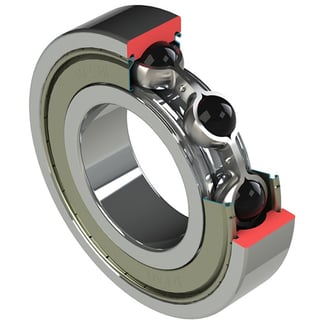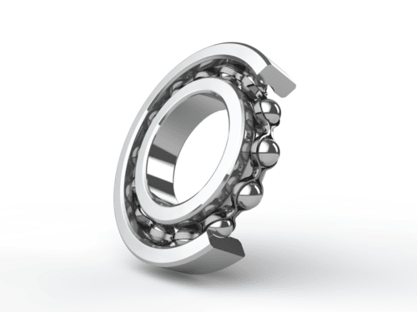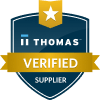Bearings improve efficiency in linear and rotational movements by reducing friction and supporting loads. The materials used to make bearings impact the applications to which they are best suited and how they perform.
Ceramic hybrid and steel bearings are common choices in many industrial applications. Here, we’ll look at both in detail, along with the strengths and typical applications of each. We’ll also look at considerations for selecting the right bearing for your needs.
Understanding Ceramic and Ceramic Hybrid Bearings
 Ceramic bearings can be made entirely of ceramic materials with the option of steel or ceramic raceways. They can be more vulnerable to impact and thermal stress; therefore, ceramic hybrid bearings are more commonly used today. Hybrids use ceramic and steel components to provide extra durability. Ceramic hybrid bearings consist of ceramic rolling elements with steel cages and races.
Ceramic bearings can be made entirely of ceramic materials with the option of steel or ceramic raceways. They can be more vulnerable to impact and thermal stress; therefore, ceramic hybrid bearings are more commonly used today. Hybrids use ceramic and steel components to provide extra durability. Ceramic hybrid bearings consist of ceramic rolling elements with steel cages and races.
Rolling elements can be made from different ceramic materials depending on the requirements of an application. Materials include:
-
Silicon nitride (Si3N4)
-
Aluminum oxide (Al2O3)
-
Zirconium oxide (ZrO2)
-
Silicon carbide (SiC)
Advantages of Ceramic Hybrid Bearings
Because they combine ceramic and steel materials, ceramic hybrid bearings have the advantages of both materials. Steel and ceramic are very strong and durable, with excellent corrosion resistance. However, many of the advantages result from the use of ceramic balls, such as:
-
Reduced friction due to greater smoothness and dimensional stability
-
Less lubrication needed due to lower coefficient of friction
-
Lighter weight
-
Not electrically conductive
-
Low thermal expansion
Applications In Which Ceramic Hybrid Bearings Excel
Ceramic hybrid bearings excel in applications that operate at high speeds, incorporate heavy loads, or include exposure to electrical currents. For this reason, they are commonly found in various types of industrial machinery, medical equipment, and applications within the automotive and aerospace industries.
Understanding Chrome Steel Bearings
 With chrome steel ball bearings, the rolling elements, cage, and races are typically made from stainless or chromium steel. Historically, steel bearings have been the most commonly used across many industries.
With chrome steel ball bearings, the rolling elements, cage, and races are typically made from stainless or chromium steel. Historically, steel bearings have been the most commonly used across many industries.
Advantages of Steel Bearings
With high load capacities and corrosion resistance (especially for stainless steel), steel bearings are suitable for numerous heavy-duty applications. Advantages of steel bearings include:
-
Lower cost
-
Durability
-
High load capacities
Limitations of Steel Bearings
Steel bearings also have limitations that can lead to diminished performance, including:
-
Compromised performance under high operating temperatures
-
Fatigue under extreme stress
-
Corrosion over time (especially chromium steel)
-
Increased friction requiring regular lubrication
A Comparison of Ceramic Bearings vs. Steel
Both types of bearings have relative strengths and weaknesses, including:
-
Ceramic ball bearings have a lower coefficient of friction than steel
-
Lightweight ceramics enable speeds 20-40% faster than steel
-
Ceramic bearings are harder than steel for durability
-
Ceramic bearings are resistant to electrical erosion and pitting
-
Ceramic bearings have superior corrosion resistance compared to chromium steel but not necessarily to stainless steel
-
Maintenance needs may differ between materials and designs
While ceramic bearings have a higher upfront cost, their durability may save money over time. Chrome steel bearings have a lower initial cost but require regular maintenance and may need to be replaced sooner.
Choosing the Best Bearing for Your Needs
Consider these factors when selecting bearings:
-
Required load capacity
-
Operating conditions including temperature and exposure to corrosion
-
Required lifespan
-
Rotational speed requirements
-
Tolerance for runout deviations
-
Lubrication requirements
Emerson Bearing is Here to Help With Your Bearing Selection
Although ceramic hybrid and steel bearings offer their own unique advantages, the right bearing choice will depend on your specific application. At Emerson Bearing, we’re a leading supplier of high-quality ball and roller bearings, as well as bushings, seals, roller chains, belts, couplings, solvents, lubricants, and more. Check out our online bearing selector tool to explore our offerings. For help determining the right bearing for your needs, contact us or request a quote today.






